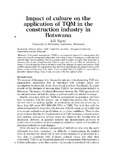| dc.contributor.author | Ngowi, A.B. | |
| dc.date.accessioned | 2009-07-09T13:42:31Z | |
| dc.date.available | 2009-07-09T13:42:31Z | |
| dc.date.issued | 2000 | |
| dc.identifier.citation | Ngowi A.B. (2000) Impact of culture on the application of TQM in the construction industry in Botswana, International journal of quality and reliability management, vol. 17, issue 4/5, pp. 442-452 | en_US |
| dc.identifier.issn | 0265671X | |
| dc.identifier.uri | http://hdl.handle.net/10311/350 | |
| dc.description.abstract | Total quality management (TQM) as an integrated approach to management that
represents a holistic management philosophy, rather than a series of techniques, is embedded with
cultural values and assumptions that are consistent with its culture of origin. This study aims to
determine the outcome of implementing TQM in a place that does not share its cultural base. A
survey of 100 construction firms in Botswana found that, although the values embedded in TQM
could be adopted within the organisations into which it is implemented, the cultural context of the
greater society resisted some of the values. It was concluded that, for TQM to be successful in a
particular cultural setting, it has to take on some of the host cultural values | en_US |
| dc.language.iso | en | en_US |
| dc.publisher | MCB University Press, http://www.emerald-library.com | en_US |
| dc.subject | National culture | en_US |
| dc.subject | TQM | en_US |
| dc.subject | Competitive advantage | en_US |
| dc.subject | Management philosophy | en_US |
| dc.subject | Construction industry | en_US |
| dc.subject | Botswana | en_US |
| dc.title | Impact of culture on the application of TQM in the construction industry in Botswana | en_US |
| dc.type | Published Article | en_US |

